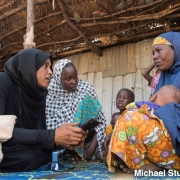You are here
How the Social Service Workforce is Vital to Helping to Achieve SDGs Related to Improving Health and Well-Being for All

 by Dr. Tapfuma Murove – Chief of Party for 4Children at CRS Nigeria
by Dr. Tapfuma Murove – Chief of Party for 4Children at CRS Nigeria
In my more than 15 years of experience as a development professional, I have always marveled at ways in which development practitioners place a lot of importance on global development frameworks and goals, as if on their own these provide the solutions to developmental issues we seek to address. While such global frameworks like the Sustainable Development Goals (SDGs) are important in focusing our attention on priority issues, there is an important piece of the puzzle that is frequently overlooked and this is what I prefer to term the ‘human factor’: the social service workforce that is essential to drive the development goals and agenda.
Of the 17 SDGs for 2015-2030, I place a special focus on goal three that aims to: ensure healthy lives and promote well-being for all at all ages. Interestingly, while looking at this SDG, questions that come to my mind are: Do we recognize the important role that the social service workforce must play in achieving this goal? How do we ensure that an adequately resourced social service workforce which is vital to achieving this SDG is in place? To me these are very important questions challenging us to support the social service workforce in carrying out its critical role of contributing to achieving improved health and well-being for all by promoting and facilitating access to needed health and well-being services.
An attempt to answer this question will not be complete without appreciating some of the glaring challenges that we encounter relating to a limited or a less than fully functional social service workforce in the field. This situation is true for government health and social service facilities, community development projects and civil society organizations in most parts of the developing world and especially sub-Saharan Africa, like in my home country of Nigeria. The current situation of the social service workforce speaks to huge personnel shortages, limited training opportunities, lack of incentives, burn out, and limited career or professional development options.
In view of ongoing challenges, and given the critical role that the social service workforce plays in driving SDGs and especially the one on improving health and wellbeing, there is need to ensure that an effective social service workforce is in place. An effective workforce is the engine that drives a functional health system. The social service workforce is the human factor that will make a difference in terms of whether or not SDG 3 on improving health and well-being is realized. In Nigeria for instance, an important cadre of the social workforce known as community volunteers or case workers play an important role in supporting children and caregivers’ access to HIV services that include: testing, TB screening, referrals, care and support that is inclusive of nutrition counseling, psychosocial support and facilitating access to other social protection opportunities. Therefore, deliberate steps need to be taken to ensure that such a social service workforce is best positioned to fulfill its critical role of contributing to achieving the SDG related to health and well-being.
Steps that need to be taken to ensure this is achieved include: increasing training opportunities for the social service workforce; professionalizing the social service workforce especially in resource-constrained settings; acknowledging and recognizing the role that para professional cadres play in contributing to linking different elements of the social service system and establishing resourcing mechanisms that create a sustainable social service workforce. Opportunities for career progression and professional development also need to be increased. This can include supporting professional social service workforce networks, associations for social service workers, and platforms for enhanced learning, information exchange and sharing of promising practices.
When these actions are taken, in addition to acknowledging and appropriately supporting the social service workforce, only then can achievement of the SDG on health and well-being become a reality.
